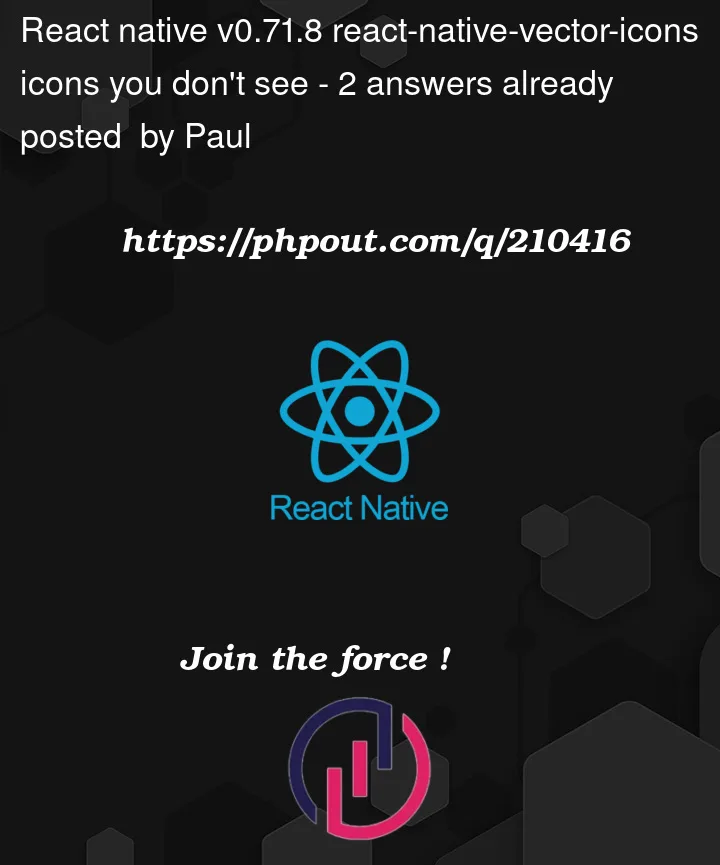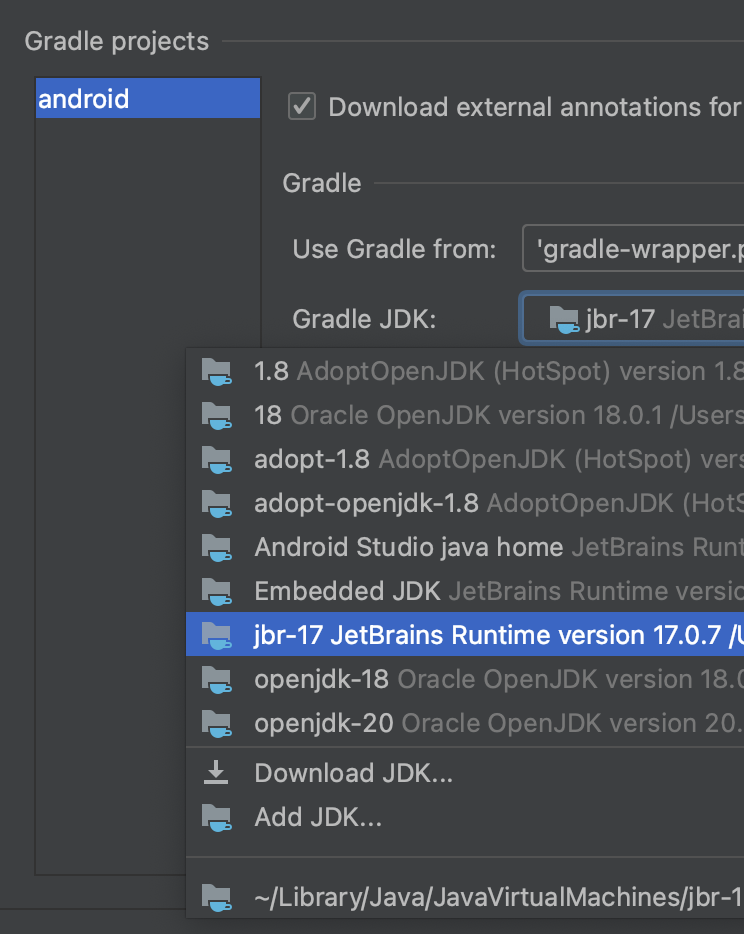I am using react native version v0.71.8.
I installed the react-native-vector-icons library, but the icons are not showing.
It seems that linking no longer works in the latest versions of react native.
So I followed the instructions, but it doesn’t compile anymore I get the below error.
I followed the instructions, I added to the android/app/build.gradle file the string apply from: "../../node_modules/react-native-vector-icons/fonts.gradle"
As seen in the file under line 4:
apply plugin: "com.android.application"
apply plugin: "com.facebook.react"
import com.android.build.OutputFile
apply from: "../../node_modules/react-native-vector-icons/fonts.gradle"
/**
* This is the configuration block to customize your React Native Android app.
* By default you don't need to apply any configuration, just uncomment the lines you need.
*/
react {
/* Folders */
// The root of your project, i.e. where "package.json" lives. Default is '..'
// root = file("../")
// The folder where the react-native NPM package is. Default is ../node_modules/react-native
// reactNativeDir = file("../node_modules/react-native")
// The folder where the react-native Codegen package is. Default is ../node_modules/react-native-codegen
// codegenDir = file("../node_modules/react-native-codegen")
// The cli.js file which is the React Native CLI entrypoint. Default is ../node_modules/react-native/cli.js
// cliFile = file("../node_modules/react-native/cli.js")
/* Variants */
// The list of variants to that are debuggable. For those we're going to
// skip the bundling of the JS bundle and the assets. By default is just 'debug'.
// If you add flavors like lite, prod, etc. you'll have to list your debuggableVariants.
// debuggableVariants = ["liteDebug", "prodDebug"]
/* Bundling */
// A list containing the node command and its flags. Default is just 'node'.
// nodeExecutableAndArgs = ["node"]
//
// The command to run when bundling. By default is 'bundle'
// bundleCommand = "ram-bundle"
//
// The path to the CLI configuration file. Default is empty.
// bundleConfig = file(../rn-cli.config.js)
//
// The name of the generated asset file containing your JS bundle
// bundleAssetName = "MyApplication.android.bundle"
//
// The entry file for bundle generation. Default is 'index.android.js' or 'index.js'
// entryFile = file("../js/MyApplication.android.js")
//
// A list of extra flags to pass to the 'bundle' commands.
// See https://github.com/react-native-community/cli/blob/main/docs/commands.md#bundle
// extraPackagerArgs = []
/* Hermes Commands */
// The hermes compiler command to run. By default it is 'hermesc'
// hermesCommand = "$rootDir/my-custom-hermesc/bin/hermesc"
//
// The list of flags to pass to the Hermes compiler. By default is "-O", "-output-source-map"
// hermesFlags = ["-O", "-output-source-map"]
}
/**
* Set this to true to create four separate APKs instead of one,
* one for each native architecture. This is useful if you don't
* use App Bundles (https://developer.android.com/guide/app-bundle/)
* and want to have separate APKs to upload to the Play Store.
*/
def enableSeparateBuildPerCPUArchitecture = false
/**
* Set this to true to Run Proguard on Release builds to minify the Java bytecode.
*/
def enableProguardInReleaseBuilds = false
/**
* The preferred build flavor of JavaScriptCore (JSC)
*
* For example, to use the international variant, you can use:
* `def jscFlavor = 'org.webkit:android-jsc-intl:+'`
*
* The international variant includes ICU i18n library and necessary data
* allowing to use e.g. `Date.toLocaleString` and `String.localeCompare` that
* give correct results when using with locales other than en-US. Note that
* this variant is about 6MiB larger per architecture than default.
*/
def jscFlavor = 'org.webkit:android-jsc:+'
/**
* Private function to get the list of Native Architectures you want to build.
* This reads the value from reactNativeArchitectures in your gradle.properties
* file and works together with the --active-arch-only flag of react-native run-android.
*/
def reactNativeArchitectures() {
def value = project.getProperties().get("reactNativeArchitectures")
return value ? value.split(",") : ["armeabi-v7a", "x86", "x86_64", "arm64-v8a"]
}
android {
ndkVersion rootProject.ext.ndkVersion
compileSdkVersion rootProject.ext.compileSdkVersion
namespace "com.fuelapk"
defaultConfig {
applicationId "com.fuelapk"
minSdkVersion rootProject.ext.minSdkVersion
targetSdkVersion rootProject.ext.targetSdkVersion
versionCode 1
versionName "1.0"
}
splits {
abi {
reset()
enable enableSeparateBuildPerCPUArchitecture
universalApk false // If true, also generate a universal APK
include (*reactNativeArchitectures())
}
}
signingConfigs {
debug {
storeFile file('debug.keystore')
storePassword 'android'
keyAlias 'androiddebugkey'
keyPassword 'android'
}
}
buildTypes {
debug {
signingConfig signingConfigs.debug
}
release {
// Caution! In production, you need to generate your own keystore file.
// see https://reactnative.dev/docs/signed-apk-android.
signingConfig signingConfigs.debug
minifyEnabled enableProguardInReleaseBuilds
proguardFiles getDefaultProguardFile("proguard-android.txt"), "proguard-rules.pro"
}
}
// applicationVariants are e.g. debug, release
applicationVariants.all { variant ->
variant.outputs.each { output ->
// For each separate APK per architecture, set a unique version code as described here:
// https://developer.android.com/studio/build/configure-apk-splits.html
// Example: versionCode 1 will generate 1001 for armeabi-v7a, 1002 for x86, etc.
def versionCodes = ["armeabi-v7a": 1, "x86": 2, "arm64-v8a": 3, "x86_64": 4]
def abi = output.getFilter(OutputFile.ABI)
if (abi != null) { // null for the universal-debug, universal-release variants
output.versionCodeOverride =
defaultConfig.versionCode * 1000 + versionCodes.get(abi)
}
}
}
}
dependencies {
// The version of react-native is set by the React Native Gradle Plugin
implementation("com.facebook.react:react-android")
implementation("androidx.swiperefreshlayout:swiperefreshlayout:1.0.0")
debugImplementation("com.facebook.flipper:flipper:${FLIPPER_VERSION}")
debugImplementation("com.facebook.flipper:flipper-network-plugin:${FLIPPER_VERSION}") {
exclude group:'com.squareup.okhttp3', module:'okhttp'
}
debugImplementation("com.facebook.flipper:flipper-fresco-plugin:${FLIPPER_VERSION}")
if (hermesEnabled.toBoolean()) {
implementation("com.facebook.react:hermes-android")
} else {
implementation jscFlavor
}
}
apply from: file("../../node_modules/@react-native-community/cli-platform-android/native_modules.gradle"); applyNativeModulesAppBuildGradle(project)
I get the following error:
* What went wrong:
A problem occurred configuring project ':app'.
> Could not open cp_proj generic class cache for build file
'/Users/nameUser/Desktop/project/android/app/build.gradle'
(/Users/nameUser/.gradle/caches/7.5.1/scripts/df0ag1ifx5mu2eejb9lni6xez).
> BUG! exception in phase 'semantic analysis' in source unit '_BuildScript_'
Unsupported class file major version 64
java:
java -version
openjdk version "20.0.1" 2023-04-18
OpenJDK Runtime Environment (build 20.0.1+9-29)
OpenJDK 64-Bit Server VM (build 20.0.1+9-29, mixed mode, sharing)
Can you help me, what am I doing wrong?





2
Answers
It’s a matter of combination of Gradle and Java versions.
I got it working with Gradle 7.5.1 and Java 16.0.2
You can change java version by changing JAVA_HOME path, make sure you download the version first, and then:
Gradle version can be changed on you project >
<root>/android/gradle/wrapper/gradle-wrapper.propertiesadd like this ->
path: android/app/build.gradle